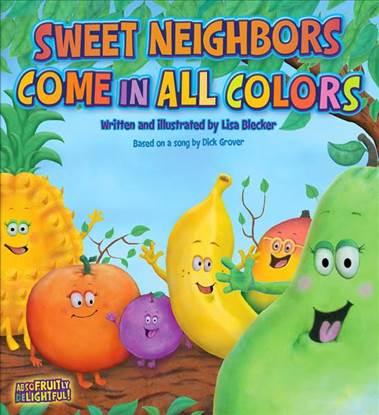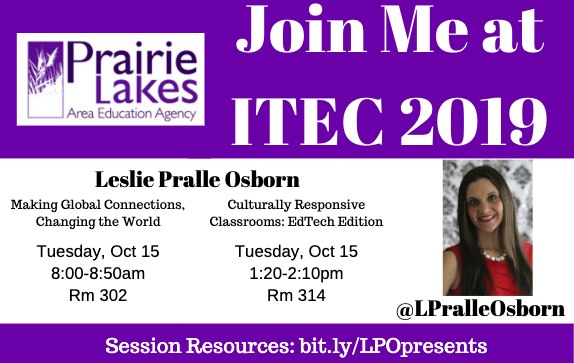| *A friend of mine reached out with an opportunity to review a book about diversity for my blog. I received this book free of charge to facilitate my honest review. "Sweet Neighbors Come in All Colors," by Lisa Blecker, is a super cute children's book! Many of you know that we donated over 100 books to NW Iowa schools in January to celebrate diverse texts and authors. This one was just released, but I'm adding it to my Amazon list of recommended books and I can't wait to share it with my early childhood friends! The book has great illustrations and puts an emphasis on caring about all our friends, regardless of not only color, but shape! Of course shapes and colors are great learning concepts for young children, but I love the body positive image on top of the reference to different colors. Such a sweet, simple way to help young learners talk about how our differences make us great and the different types of people in our lives. It even comes with a song and links to YouTube videos! |
|
0 Comments
Educator friends, you may have to hang in there with me for a minute, but you all know that a school is a family. I'll make more specific comparisons at the end of this piece, but know that when I say "family" I'm talking to you, too.
If you live in the Midwest right now you know what I'm talking about, but for those of you who don't, I'm living in a "winter wonderland" of 8-10 foot drifts, closed highways and interstates, and have been cooped up in my house since Saturday afternoon. That's two days of being home - which to some of you probably sounds great, however when you know you CAN'T leave it's very different from choosing to stay home. Anyway, 48 hours into this I've found myself doing some heavy thinking and I'd love some thoughts from my online friends. Actually, I've found myself asking a lot of questions that I don't have the answers to.
Guys, this is probably 1/3 of the list of questions I fired at my husband tonight over dinner, but you get the idea. I'm struggling a lot lately with my role as a white woman in raising a biracial child. Somedays it seems like one step forward, two steps back. I'm so proud of the lengths we've gone to to make sure she has books and dolls and holiday traditions that mirror her background. Her "babies" (dolls) look like her in several shades of tan and brown, the books on our shelves feature characters of every skin tone, but day after day I still find myself wondering if it's enough - or too much? Why am I sharing these struggles with you on my professional blog (I feel like I ask this question a lot too)? Because I think it's important for us to recognize the struggle and process that we go through. No, not like "poor white woman is confused," but in a "how do I, as an educator, make sure that I am meeting the needs of ALL my kids in an authentic way?" kind of way. I don't have a tribe of people that are sharing my experience right now (if you or someone you know is raising white kids and biracial kids in an interracial marriage I'm looking for friends), but I think I could find my tribe in the educators who are trying to do justice for all their kids like each and every one is their own. I'm headed to the Robin Di'Angelo lecture (author of White Fragility) at Iowa State University tomorrow night and her work has helped me realize just how important it is to a) recognize why white people struggle with these questions, and b) help white people have these conversations. So if you're a white educator (and 80%+ of us are) trying create a culturally inclusive classroom (unfortunately a much smaller percentage - though this is just a guess), I'd love to connect. Let's be friends and identify our questions and support each other. Let's reach out to our friends of color - not as token experts on race, remember, it is not the burden of people of color to educate white people about race and racism - but as partners in learning, as another perspective, and as professional colleagues. You'll notice that this post is all questions and no answers. I have found some great resources, but I want to have a conversation first. The need for constituent voices is an essential part of how our government functions. As school leaders it is our duty to be advocates for our students and for our schools. Advocating for resources for our schools can be done in numerous ways. Some of these methods include mailing, advocacy groups, and supporting the campaign.
One way school leaders can communicate with legislators is to contact them directly either via mail or email. In recent years it has been said that it is more effective to send physical mail than email because legislator inboxes are flooded with emails, but a piece of physical mail may stand out. However, it can also be more difficult to get a response via physical mail because it takes more effort. Being on an email listserv can get you quick and frequent access to your legislator’s current priority list so you can make timely communication about issues. For example, Iowa House Speaker Linda Upmeyer’s most recent email asked for input on sports betting in Iowa. While this is not necessarily closely aligned with education, it is an excellent example of how to give timely input when a legislator is seeking it. Another powerful way to communicate with a legislators is to join an advocacy/lobby group. Joining a group like RSAI or Iowa’s UEN group gives you a leg up because they do a lot of leg work for you. The groups identify priorities, research bills that may come up and their likelihood of passing, organize events for face-to-face time at the capitol, and provide materials and talking points that administrators can easily implement into a conversation so that they sound informed on the issues. While your individual school voice can get lost in a larger crowd, these groups tend to advocate for legislation that is beneficial for all schools, meaning that you have power in numbers. You could also join other community groups that do not have a specific education lens but do lobbying work. Those people are part of your community and it is both important to share those issues in those spaces and gives you a broader constituent base and voice when talking to your representatives. Another suggestion is giving a small donation to the campaigns of your elected officials. It does not have to break the bank, but $25 does get you on mailing lists and keep you on the radar as an invested supporter. You do not have to support only one party, and probably shouldn’t, because as party majority changes you will still want to have a voice with the decision makers in your area. Finally, while it may not be direct communication, it is also important to communicate with the students, parents, and communities your serve about your school’s legislative priorities. Helping them understand the issues and encouraging and supporting them in contacting legislators themselves amplifies your school community’s voice in the process. Want to see some of this year's education priorities in Iowa? Check out the Urban Education Network's one-page list of priorities (which is very similar to the list identified by the Rural School Advocates of Iowa). We were sitting at dinner about a week ago with some friends and some new acquaintances and race came up (because isn't that what you talk about at dinner with people you've just met?). During the conversation one person made a statement about how reverse-racism is worse (than racism) and she knows this because she dated a black guy for nine months.
This work is HARD, y'all, but I've been sharing my journey with you, and part of the journey includes the missteps along the way. I was coming off of an amazing two days of training with Teaching Tolerance literally the day before this happened - including "Facilitating Critical Conversations." I love their Speak Up pocket guide as a quick reminder to think about how to stop or change a conversation. I was feeling SOOO good about it, like I really have the right tools in my toolbox to have tough conversations about race; to be able to educate and speak up without alienating. But in that particular moment there was no educating or seeking to understand. It was quick shutdown, disbelief, and dismissal. My quick jump to soapbox about the definition of racism and its necessary ties to systemic injustice rendering reverse racism impossible (because it doesn't have the weight of a power structure behind it) was not what was needed in that space, but I was so caught of guard by such a bold and misinformed statement I didn't stop to think first. I can only seek to do better next time, but I wanted to share my story in an effort to keep my journey toward being a strong advocate for anti-racism and social justice an honest one. I've replayed a hundred options for how I might have handled this differently in my head since that evening, but I'm curious, what would you have done? |


 RSS Feed
RSS Feed
